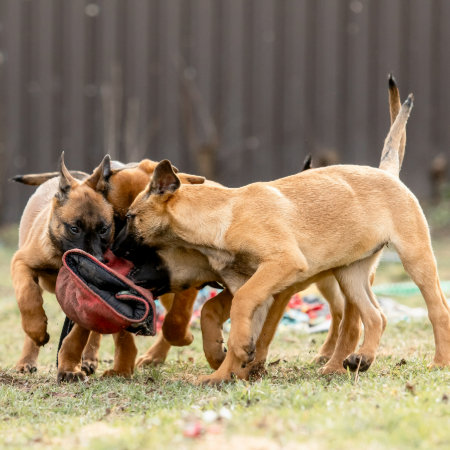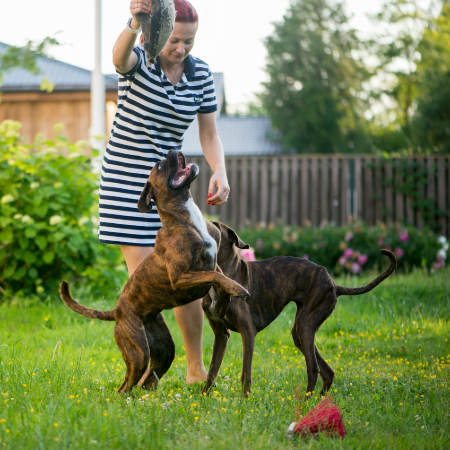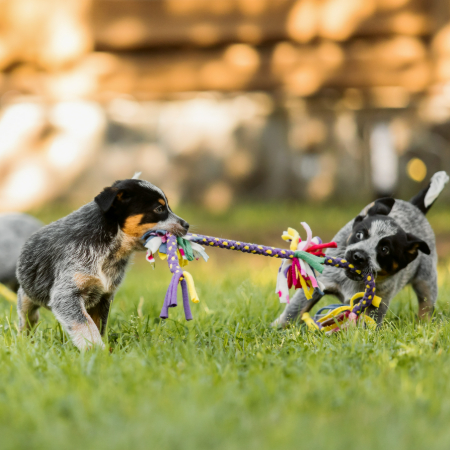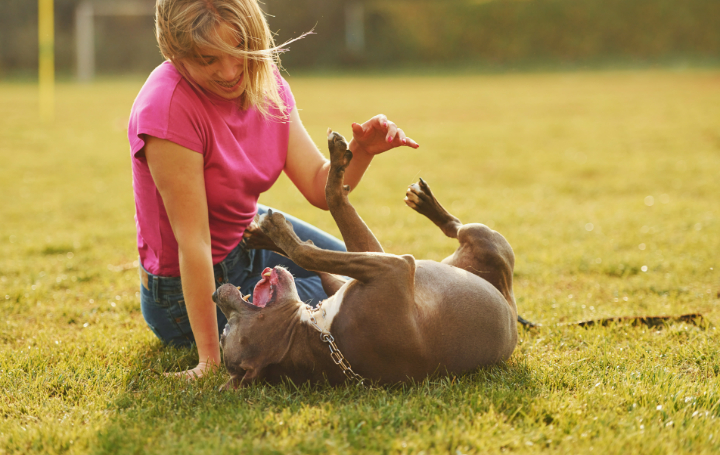Understanding Dog Play: The Importance of Socialization and Interaction
Dogs are more than just loyal companions; they’re curious, social creatures who thrive on interaction and play. Whether they’re bounding through a park, chasing after a squeaky toy, or just rolling around with their furry friends, play is essential to a dog’s overall health and well-being. But did you know that the way your dog plays is closely tied to its socialization skills, personality, and emotional development? Let’s dive into the importance of dog play, how it helps with socialization, and why it’s something every dog owner should encourage.
Play: A Natural Instinct
If you’ve ever watched a puppy dart around, tail wagging, you’ve seen the natural instinct to play in action. Dogs, like most animals, are hardwired for play. For puppies, it’s how they learn about their environment, develop motor skills, and discover social boundaries. But even as dogs grow into adults, play remains a vital part of their lives.

From tug-of-war to chasing balls, play is a way for dogs to express themselves, interact with others, and release pent-up energy. Without enough playtime, dogs can become bored, anxious, and even destructive. Just like humans, they need an outlet for their energy and emotions, and play is one of the best ways to provide that.
The Role of Socialization in Dog Play
Socialization is one of the key components of a dog’s development, especially when they’re young. It’s the process of exposing your dog to different environments, people, other animals, sounds, and experiences in a controlled way. This helps them become well-adjusted, confident, and comfortable in various situations.
When it comes to dog play, socialization plays a crucial role. Dogs who are well-socialized are more likely to engage in healthy play behaviors with other dogs. They learn to communicate with their peers, whether it’s through body language, vocalizations, or play signals like bowing. A well-socialized dog can read the signals of other dogs, understanding when play is friendly and when it might be getting too rough.
Think about how puppies learn from their littermates. They play together, testing their strength, learning to take turns, and figuring out how to manage their energy levels. For example, a puppy might bite too hard, but its littermate will yelp or walk away. This teaches the puppy to control its bite and respect boundaries. Dogs that haven’t had enough socialization might struggle to interact with others, showing fear or aggression instead of the playful excitement you’d expect.
Different Types of Play and Their Benefits
Play is not just about having fun – it’s also about learning important skills that contribute to your dog’s physical and mental development. Let’s look at the different types of play dogs engage in and what benefits each provides:
1. Solo Play
Solo play happens when your dog is playing alone, whether it’s chewing on a toy, fetching a ball, or digging in the yard. This type of play helps your dog practice its coordination, concentration, and problem-solving abilities. Toys like chew bones or interactive puzzle toys are great for keeping your dog entertained and mentally stimulated. Solo play also allows your dog to release pent-up energy and calm down after a long day.
2. Interactive Play
Interactive play is when you and your dog play together, whether it’s a game of fetch, tug-of-war, or hide-and-seek. This type of play strengthens the bond between you and your dog. It’s not just about fun – interactive play provides physical exercise, reinforces good behavior (like returning a ball), and helps you teach your dog commands in a more engaging way.
3. Social Play
Social play happens when your dog interacts with other dogs. It’s an essential part of their socialization and teaches them important lessons about how to behave around other animals. Social play can take many forms, like chasing, wrestling, or simply running around together.

It helps dogs learn the boundaries of play and develop important social skills. For example, if your dog plays too roughly with another dog, the other dog might signal its discomfort by growling or stopping play. These cues help your dog adjust its behavior, leading to better interactions in the future.
4. Exploratory Play
This type of play is driven by curiosity. Dogs love to explore their environment, sniffing around to learn more about their surroundings. Whether they’re digging, sniffing trees, or pawing at something new, exploratory play helps them understand the world. It also stimulates their minds, encouraging problem-solving and critical thinking.
The Impact of Play on Behavior
Play isn’t just about burning off excess energy – it also plays a significant role in shaping your dog’s behavior. A dog that engages in regular playtime is more likely to develop positive behaviors, while a lack of play can contribute to behavioral issues.
1. Reducing Anxiety and Stress
Just like us, dogs can experience stress. When they don’t have an outlet for their energy or frustrations, it can manifest as anxiety, destructive chewing, barking, or digging. Regular play helps reduce stress levels by allowing your dog to release nervous energy in a healthy, constructive way. If your dog is feeling anxious, playtime can be a great way to calm them down and lift their mood.
2. Preventing Destructive Behavior
A bored dog is often a destructive dog. Without enough mental or physical stimulation, dogs may engage in unwanted behaviors like chewing furniture, digging holes, or getting into things they shouldn’t. Play provides a positive outlet for your dog’s energy, helping to prevent these types of destructive actions.
3. Building Confidence
Playtime can also help build your dog’s confidence. Dogs who are unsure about certain situations or other animals can benefit from structured play with other dogs. It’s a safe way for them to learn how to navigate new experiences and gain confidence in their social skills.
How to Encourage Healthy Play
Now that you know why play is so important for your dog, here are a few tips on how to encourage healthy play and socialization:
Play with Your Dog Regularly Make time for daily play sessions with your dog. Whether it’s a walk in the park, a game of fetch, or a tug-of-war, this time strengthens your bond and keeps your dog active and engaged.
Set Up Playdates with Other Dogs If possible, arrange playdates with other well-behaved dogs. This helps your dog learn how to socialize with peers, read body language, and navigate different play styles.
Enroll in Puppy Classes If you have a puppy, enrolling in a puppy socialization class can be a great way to expose them to other dogs and people in a controlled environment. These classes teach essential socialization skills that will benefit your dog throughout their life.

Provide Plenty of Toys Toys are essential for solo play and mental stimulation. Be sure to have a variety of toys that encourage different types of play, like chew toys, fetch toys, and puzzle toys that challenge your dog’s brain.
Respect Your Dog’s Limits Not all dogs have the same play style. Some may prefer a more laid-back play session, while others may be more energetic. Pay attention to your dog’s body language and know when to take breaks. If they seem tired or overwhelmed, it’s okay to stop and let them rest.
Conclusion: Play is Essential for a Happy Dog
Play is a fundamental part of a dog’s life, helping them develop social skills, physical fitness, and mental agility. Whether they’re playing with you, or other dogs, or exploring their surroundings, playtime provides the mental and physical stimulation they need to thrive. Encouraging play and proper socialization from an early age ensures your dog grows into a confident, well-adjusted, and happy companion. So next time your dog looks at you with those eager eyes, grab a toy, and enjoy the benefits of play together!
Tags










